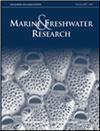驯化温度和暴露时间对黑足Pāua生长范围的影响
IF 1.5
4区 环境科学与生态学
Q2 FISHERIES
引用次数: 0
摘要
气候变化和海水温度升高会极大地影响海洋变温动物的生理过程和生长,包括黑足鱼Pāua (Haliotis iris)。生长范围(SFG)是实验室导出的可用于生长的能量测量,但在Pāua中尚未进行检查。目的测定季节性采集的Pāua在12、15、18和21℃恒定驯化温度下28天的SFG及其血淋巴参数。方法测定海带食物的生长可利用能量,计算驯化第1、14、21和28天的呼吸和氨排泄损失。还测量了血淋巴参数。驯化3d后,SFG变化很大。经过2周的驯化,SFG在所有温度下均呈阳性。呼吸和排泄能量取决于驯化温度和驯化时间。驯化温度对血淋巴参数有影响。结论Pāua对21°C温度的适应能力有限,表明它们不能在此温度下有效生长。本研究表明,气候变化导致的海水温度升高可能对成虫Pāua产生不利影响,并可能影响其未来的生长和分布。本文章由计算机程序翻译,如有差异,请以英文原文为准。
Effects of acclimation temperature and exposure time on the scope for growth of the blackfoot Pāua (Haliotis iris)
Context Climate change and increased seawater temperatures can greatly affect physiological processes and growth of marine ectotherms, including the blackfoot haliotid, Pāua (Haliotis iris). Scope for growth (SFG) is a laboratory-derived measure of the energy available for growth but this has not been examined in Pāua.Aims To measure SFG of seasonally collected Pāua and their haemolymph parameters at constant acclimation temperatures of 12, 15, 18 and 21°C for 28days.Methods Energy available for growth was measured from kelp food and losses due to respiration and ammonia excretion calculated on Days 1, 14, 21 and 28 of acclimation. Haemolymph parameters were also measured.Key results After 3days of acclimation, SFG was highly variable. Following 2weeks of acclimation, SFG was positive for all temperatures. Respiration and excretion energies depended on both acclimation temperature and time. Haemolymph parameters were affected by acclimation temperature.Conclusion Pāua have limited ability to acclimate to a temperature 21°C suggesting that they would not grow effectively at this temperature.Implications This research suggests that adult Pāua can be adversely affected by increased seawater temperature, resulting from climate change and this could affect their future growth and distribution.
求助全文
通过发布文献求助,成功后即可免费获取论文全文。
去求助
来源期刊

Marine and Freshwater Research
环境科学-海洋学
CiteScore
4.60
自引率
5.60%
发文量
76
审稿时长
3.8 months
期刊介绍:
Marine and Freshwater Research is an international and interdisciplinary journal publishing contributions on all aquatic environments. The journal’s content addresses broad conceptual questions and investigations about the ecology and management of aquatic environments. Environments range from groundwaters, wetlands and streams to estuaries, rocky shores, reefs and the open ocean. Subject areas include, but are not limited to: aquatic ecosystem processes, such as nutrient cycling; biology; ecology; biogeochemistry; biogeography and phylogeography; hydrology; limnology; oceanography; toxicology; conservation and management; and ecosystem services. Contributions that are interdisciplinary and of wide interest and consider the social-ecological and institutional issues associated with managing marine and freshwater ecosystems are welcomed.
Marine and Freshwater Research is a valuable resource for researchers in industry and academia, resource managers, environmental consultants, students and amateurs who are interested in any aspect of the aquatic sciences.
Marine and Freshwater Research is published with the endorsement of the Commonwealth Scientific and Industrial Research Organisation (CSIRO) and the Australian Academy of Science.
 求助内容:
求助内容: 应助结果提醒方式:
应助结果提醒方式:


